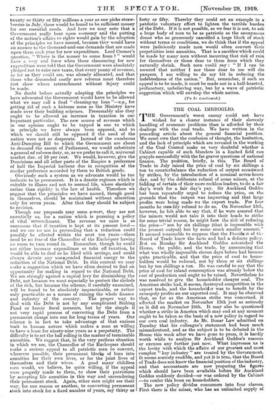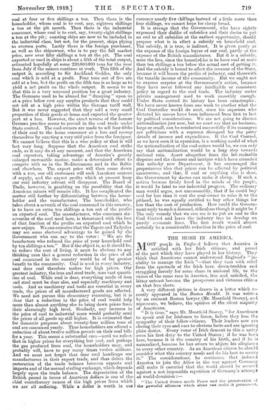THE COAL IMBROGLIO. T HE Government's worst enemy could not have
wished for a clearer instance of their slovenly handling of economic problems than is afforded by their dealings with the coal trade. We have written in the preceding article about the general financial position. We must own that the confusion of thought, the hesitation, and the lack of principle which are revealed in the working of the Coal= Control make us very doubtful whether a Cabinet capable of such blunders in a limited field can grapple successfully with the far graver questions of national finance. The position, briefly, is this. The Board of Trade in July raised the price of coal by six shillings a ton to counterbalance the reduction of output occasioned by strikes, by the introduction of a nominal seven-hours day, and by the deliberate refusal of some miners, at the bidding of certain of their more reckless leaders, to do a fair day's work for a fair day's pay. Sir Auckland Geddes has been repeatedly urged to reduce the price, on the grounds that the output was improving and that large profits were being made on the export trade. For four months he steadily refused to do so. On November 13th, however, he felt able to say that, if he were assured that the miners would not take it into their heads to strike for some trivial reason, he might face the risk of reducing the price—" not by six shillings (that is impossible with the present output) but by some much smaller amount." It seemed reasonable to suppose that the Preside at of th3 Board of Trade knew the facts and had a definite policy. Bat on Monday Sir Auckland Geddes astonished the House, the public, and the trade, by announcing that what was wholly impossible eleven days before had become quite practicable, and that the price of coal to house- holders would be reduced, not by three or six shillings but by ten shillings a ton. He was careful to say that the price of coal for inland consumption was already below the cost of production and ought to be raised. Nevertheless he was resolved to give the householder cheaper coal. The American strike had, it seems, destroyed competition in the export trade, and the householder was to benefit by the monopoly profits on our exported coal. It may be observed that, so far as the American strike was concerned, it affected the market on November 13th just as seriously as it did on November 24th. It may also be questioned whether a strike in America which may end at any moment ought to be taken as the basis of a new policy in regard to our own coal industry. As Mr. Boner Law admitted on Tuesday that his colleague's statement had been much misunderstood, and as the subject is to be debated in the House this week after we have gone to press, it is hardly worth while to analyse Sir Auckland Geddes's reasons or excuses any further just now. What impresses us is the levity with which the affairs of our greatest and most complex key industry " are treated by the Government. It seems scarcely credible, and yet it is true, that the Board of Trade does not know the financial position of the industry, and that accountants are now preparing the figures which should have been available before Sir Auckland Geddes suddenly decided—or was ordered by the Cabinet —to confer this boon on householders.
The new policy divides consumers into four classes. First there is the miner, who has an unlimited supply of coal at four or five shillings a ton. Then there is the householder, whose coal is to cost, say, eighteen shillings a ton at the pit mouth. Then there is the industrial consumer, whose coal is to cost, say, twenty-eight shillings a ton at the pit ; coasting ships are now to be included in the industrial class, but not, for the present, ships plying to oversea ports. Lastly there is the foreign purchaser, as well as the shipowner, who is to pay the full market price, now over fifty shillings a ton at the pit. The coal exported or used in ships is about a fifth of the total output, estimated hopefully at some 220,000,000 tons for the year from July if the miners continue at work. This fifth of the output is, according to Sir Aucldand Geddes, the only coal which is sold at a profit. Four tons out of five are sold at a loss, but the profit on the fifth ton is so large as to yield a net profit on the whole output. It seems to us that this is a very unsound position for a great industry. The Germans used to be abused for " dumping " upon us at a price below cost any surplus products that they could not sell at a high price within the German tariff wall. But it was never suggested that they sold a very small proportion of their goods at home and exported the greater part at a loss. However, the exact reverse of the former German practice seems to prevail in the coal trade under State control. The coal-owners are made to sell four-fifths of. their coal to the home consumer at a loss and recoup themselves by exacting a very-stiii price from the foreigner. We cannot believe that this is a wise policy or that it will last very long. Suppose that the American coal strike ends, as it may do at any moment, and that the American coal exporters, taking advantage of America's greatly enlarged mercantile marine, make a determined effort to compete with us in the Mediterranean and in the Baltic and elsewhere. The export price will then come down with a run, our old customers will seek American sources of supply, and the extort profits which at present keep our coal industry solvent will disappear. The Board of Trade, however, is gambling on the possibility that the American miners will remain idle. It has complicated the matter still further by differentiating between the house- holder and the manufacturer. The householder, who takes about a seventh of the coal consumed in this country, is to have an extra ten shillings a ton out of the profits on exported coal. The manufacturer, who consumes six- sevenths of the coal used here, is threatened with the loss of that fraction of the profits on exported coal which he now enjoys. We can conceive that the Tapers and Tadpoles may see some electoral advantage to be gained by the Government who can say to the voter : " We are the benefactors who reduced the price of your household coal by ten shillings a ton." But if the object is, as it should be, to reduce the cost of living, it must be obvious to any thinking man that a general reduction in the price of all coal consumed in the country would be of far greater benefit to the community. Coal is used in every industry, and dear coal therefore makes for high prices. Our greatest industry, the iron and steel trade, uses vast quanti- ties of coal. While coal is dear, everything made of iron and steel must be dear also, and especially machinery and tools. And as machinery and tools are essential in every trade, the prices of all manufactured goods are affected. We need not pursue this elementary reasoning, but it is Hear that a reduction in the price of coal would help more than almost anything else to bring down prices from their alarmingly high level. Similarly, any increase in the price of coal to industrial users would probably send the prices of all goods up still higher. It is estimated that for domestic purposes about twenty-four million tons of coal are consumed yearly. Thus householders are offered a reduction of about twelve million pounds on their coal bills for a year. This seems a substantial sum—until we reflect that in higher prices for everything but coal, and perhaps the gas produced from coal, the householders may, and probably will, have to pay many times twelve millions. And we must not forget that dear coal handicaps our manufacturers in their export trade, and thus defers the restoration of the trade balance between exports and imports and of the normal sterling exchange, which depends largely upon the trade balance. The depreciation of the British pound in terms of American dollars is one of the. chief contributory causes of the high prices from which we are all suffering. While a dollar is worth in our currency nearly five hhillings instead of a little more than four shillings, we cannot hope for cheap bread. It is strange that the Government, who have rightly expressed their dislike of subsidies and their desire to put an end to all subsidies at the earliest opportunity, should propose what is in effect a subsidy on household coal. The subsidy, it is true, is indirect. It is given partly at the expense of the foreign buyer of our coal, partly at the expense of the British manufacturer. But it is a subsidy, none the less, since the householder is to have coal at more than ten shillings a ton below the actual cost of getting it. And the subsidy is bound to affect the revenue of the State, because it will lessen the profits of industry, and therewith the taxable income of the community. But we ought not to express surprise at the Government's action, because they have never followed any intelligible or consistent policy in regard to the coal trade. The industry under private management used to work smoothly enough. Under State control its history has been catastrophic. We have never known from one week to another what the Coal Controller would do next, since his superiors who dictated his moves have been influenced from first to last by political considerations. We are not going to discuss nationalization just now, but we must say that no business, large or small, can be conducted successfully if its managers are politicians with a supreme disregard for the petty details of income and expenditure. if the Coal Control, as we have seen it in operation, is a working model of what the nationalization of the coal-mines would be, we can oily say that nationalization would be a long step towards national ruin. Apart altogether from the inkrminable disputes and the clamour and intrigue which have attended this unlucky new Department, it has encouraged the preposterous idea that prices can be affected by political manoeuvres, and that, if coal or anything else is dear, the Government by decree can make it cheap. If such a notion became firmly fixed in the minds of the people, it would be fatal to our industrial progress. The ordinary man would argue, not unreasonably, that if he could buy coal for less than it cost the coal-owner to raise it to the pithead, he was equally entitled to buy other things for less than the cost of production. How could the Govern- ment reply to such a demand, ridiculous though it might be ? The only remedy that we can see is to put an end to the Coal Control and leave the industry free to develop on purely economic lines. The first result would almost certainly be a considerable reduction in the price of coal.











































 Previous page
Previous page